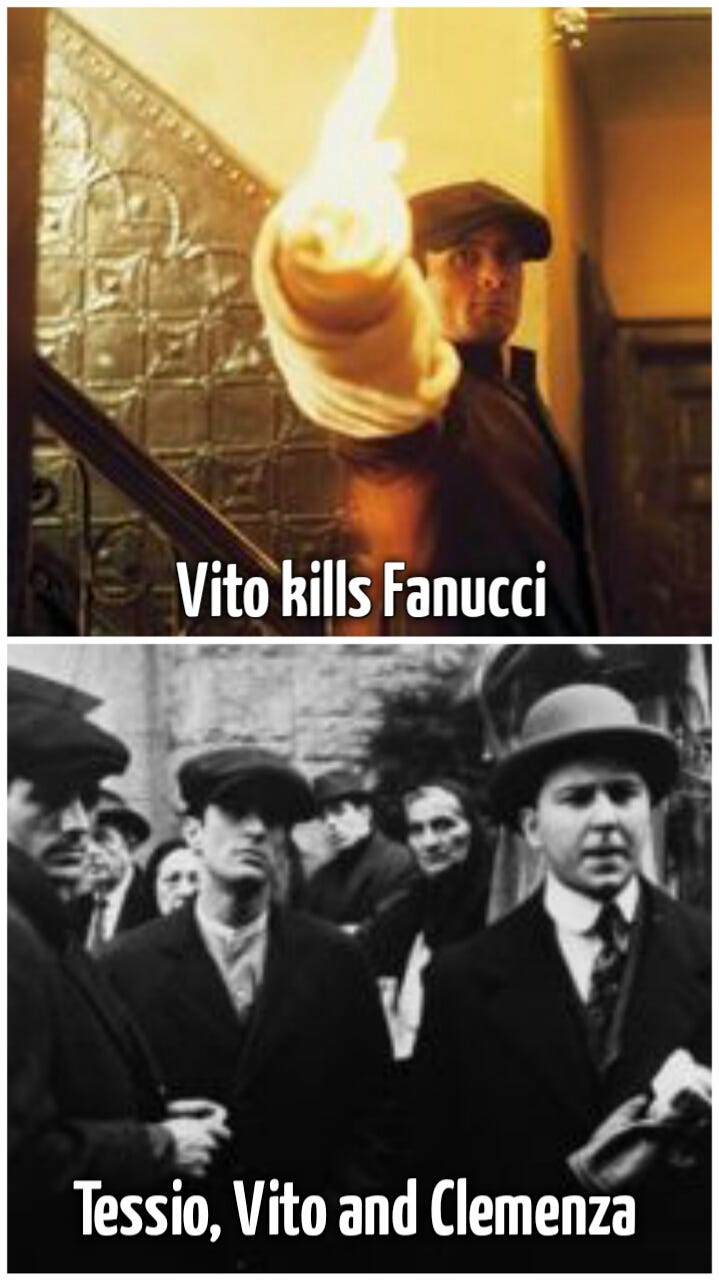THE BOOK OF RISE
Don Fanucci

New York, in 1917, 'Don' Fanucci became aware of the partnership between Vito, Clemenza and Sal Tessio, and demanded that they "wet his beak", IE, pay tribute to him. Fanucci had threatened to inform the police if the trio didn’t pay a substantial portion of their ill-gotten gains. Clemenza and Tessio were alarmed and had wanted immediately to pay Fanucci, quite certain that he was connected to the Mafia. While his friends were busy panicking, Vito calmly recalled everything he knew about Fanucci and the Mafia (the "Black Hand" as referred to in this part of the story). He remembered that the padrone walked the streets with no obvious protection, which had led to an incident where Fanucci was knifed by several neighborhood boys whose families he had tried to extort. He later murdered one of the boys, but had called off the vendetta after the families of the remaining two paid him an indemnity to foreswear his vengeance. Vito guessed that Fanucci actually allowed himself to be bought off because he had gotten lucky and would be unable to kill the remaining two boys now that their guard was up, suggesting Fanucci worked alone.
Vito came to the realization that Fanucci only acted like he was a mob boss in front of easy-to-trick immigrants, as no mafioso would allow an assassin to live, even if paid enormous sums of money, and no member of any mafia would ever need or resort to informing the police as a threat. Thinking further, he decided that Fanucci’s life was not worth $700. Vito asked his friends to leave everything in his hands to convince Fanucci to accept less money, telling his friends "I’m going to make him an offer he can’t refuse". When Vito later met with Fanucci, he offered only a fraction of the amount demanded — $100 of the $600 Fanucci expected. Fanucci is impressed with Vito’s courage, and offered him work. Vito interpreted his ability to low-ball Fanucci as a sign of the latter’s weakness, thus confirming his suspicion of Fanucci’s vulnerability. Vito then allowed Fanucci to leave the building, so witnesses could confirm that he left alive. Vito had chosen the day of a major festival to spy on and follow Fanucci from the rooftops as Fanucci went home, and surprised him at the door to his apartment. He shot Fanucci three times with a muffled pistol, as the din from the festival and the towel Vito had wrapped the muzzle of his pistol in drowned out the noise from the gunshots. After the hit, Vito retrieved the money Fanucci had taken earlier in the day and then destroyed the gun, dismantling it and dropping it down vent pipes of the apartment building. Despite all the precautions he had taken to insure that he wouldn’t be suspected, it turned out that the police thought Fanucci was scum and were in no hurry to find his killer, believing it was a routine gangster execution.
With Fanucci dead, Vito earned the respect of the neighborhood, becoming known as a "Man of Respect" on the streets, and was soon asked to intercede in local disputes, gaining a reputation for never turning down someone who came to him for help and for being able to "reason" with "unreasonable" people. Although he had declined to do so at first out of modesty, Vito eventually started accepting "gifts" from local businesses and racket bosses in return for "ensuring that our patrons know that they are safe", and Vito was soon making a wage of $100 a week (in the 1900s this was an enormous amount of money). Vito, Clemenza and Tessio eventually took over the neighborhood, treating it with a great deal more respect than Fanucci did.
